As the sustainability revolution expands, it’s more important than ever to learn how responsible principles and practices are redefining the future of business. That’s why Ivey’s HBA Sustainability Certificate, directed by Professor Oana Branzei and supported by the Centre for Building Sustainable Value, has been an in-demand program for the next generation of leaders.
Over the past decade, the size of the program cohort has tripled and more than 2,800 students have taken an elective course in the program as part of their sustainability journey. We spoke with current students and alumni of the Sustainability Certificate who together shared five reasons to consider it.
1) To be part of a community
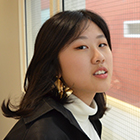 Jessica Le is an HBA ’22 candidate
Jessica Le is an HBA ’22 candidate
Jessica Le’s reason for taking the Sustainability Certificate proves that word of mouth is the best form of advertising. While in HBA1, she heard HBA2 students talk about the program’s great mentorship and workshop opportunities. Her curiosity was piqued. Le said she enrolled in the program to connect with other students who shared her passion for social impact – a small but growing community at Ivey.
Training on Indigenous learning
Now that she has gone through the program, the part she enjoyed most was unexpected. Le said her most memorable experience was being part of the Impact Assessment Team that evaluated what HBA1 students learned from taking the online educational program, The Path: Your Journey Through Indigenous Canada™. Eight Sustainability Certificate students were chosen for the team and trained with Indigenous leaders on the context of Indigenous learning.
Related to this story
The other students in the [Impact Assessment] group are brilliant, and I’m learning a lot about what goes into an educational module, as well as how to assess the effectiveness of those modules. It’s some really interesting stuff that will be helpful after I graduate.”
2) To solve the world’s most pressing problems
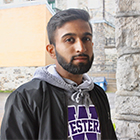
Sibtain Manesiya is an HBA/Engineering ’22 candidate
Coming into university, Sibtain Manesiya says he was more entrepreneurially-minded than sustainability-focused and wanted to solve the world’s problems. But during his first year of Western Engineering, he learned how entrepreneurial innovations can improve quality of life.
Manesiya was part of a student team that created a system at the Western Fair Sports Centre to help members of the London Blizzard Sledge Hockey team get on and off the ice without being carried. Through that experience, he saw the role of business in improving communities and later took the Sustainability Certificate to learn more about the sustainability issues that plague companies.
“I did not know much about purpose or impact, but I knew sustainability was the future,” he said. “If companies aren’t responsible for developing the communities and environments in which they operate, we’re not going to have a future.”
Embracing purpose and impact
While taking the program, Manesiya has become passionate about making sustainability purpose and impact part of his career.
His advice for future sustainability certificate students: Embrace the program.
If you truly embrace the certificate program, it will embrace you back. You will begin to learn and see the world through a special lens, and, most importantly, work toward cultivating the future you want to see."
3) To learn how to balance purpose and profit
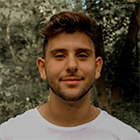 James Yeretsian is an HBA ’22 candidate
James Yeretsian is an HBA ’22 candidate
James Yeretsian says the “North Star” driving his career path is to do work that has a broader impact on society. Taking the Sustainability Certificate is a means to that end since the program introduces students to the role of business as a force for positive change.
Yeretsian said the course offerings were the biggest highlight. He particularly enjoyed doing a research project looking at whether stock buybacks among publicly traded companies in the U.S. have contributed to rising levels of income inequality over the years.
Access to experts
“The professor supervising my work was an expert in the field and I learned much more about academic research under his guidance. This will prepare me well for graduate school,” he said.
The required social enterprise course has taught me much more about social entrepreneurship and how businesses can successfully balance purpose with profit.”
4) To learn about sustainability careers
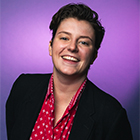 Christine Ward, HBA ’17, is Manager of Business Development at Radicle
Christine Ward, HBA ’17, is Manager of Business Development at Radicle
Christine Ward proudly calls herself a “sustainability nerd” and was eager to focus her career on sustainability. She took the Sustainability Certificate to learn about potential opportunities.
“Taking part in the sustainability certificate demonstrated to me that my career could involve nerding out about positive change in a variety of different ways,” she said. “I learned there wasn’t only one way to have a career in sustainability.”
Building a network
In addition, the program allowed her to build her network of “sustainability nerds.” She frequently connects with some program alumni to chat about all things sustainability.
For those who are considering whether the program is a fit, Ward offers what she calls the “sustainability nerd quiz.” It’s just one question:
Do you often get really excited learning about a sustainable product or process and find yourself in a very deep dive trying to know all you can about said thing? If the answer is yes, you’re definitely a sustainability nerd!"
5) To be the change
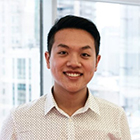 Brennan Wong, HBA ’19, is a Senior Business Analyst and Sustainability Fellow at McKinsey & Company
Brennan Wong, HBA ’19, is a Senior Business Analyst and Sustainability Fellow at McKinsey & Company
Brennan Wong’s journey into sustainability started with a broader social impact lens. While in high school, he founded Pledges For Change, a student-led non-profit organization that supports youth volunteerism in Canada and around the world.
As he grew older, he realized there are many different challenges in the world, including sustainability. He took the Sustainability Certificate to learn about the worthwhile initiatives he could get involved with during his career.
Sustainability careers
“Sustainability wasn’t something I grew up knowing I wanted to do, but it’s what I do in my career now. As the attitudes in the corporate world started to shift toward the importance of sustainability, I knew this was where I wanted to spend more of my time,” he said.
As a mentor to Sustainability Certificate students, Wong said he is excited to see Ivey’s focus on sustainability expand beyond the program.
If there is a way to embed what we learn in the Sustainability Certificate at a higher level, that would be really exciting. Sustainability is such a pressing problem that it will require global mindshare to address it.”



